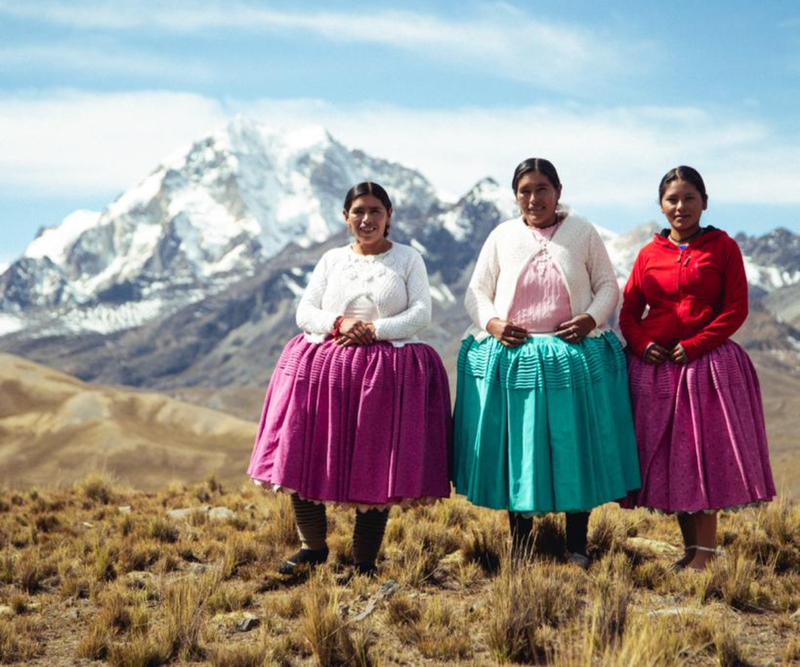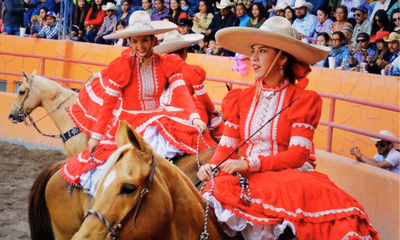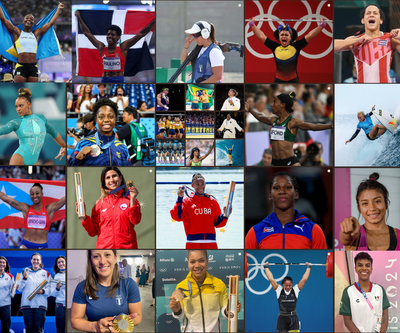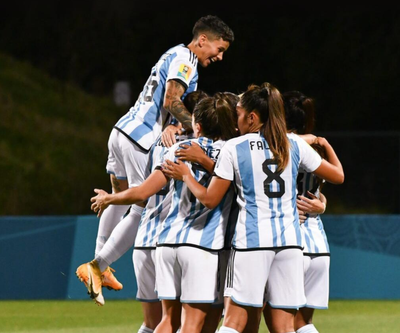Across Latin America, indigenous women athletes are bringing a new take to the sports world, challenging stereotypes and reclaiming their cultural identity. From the revitalization of Pok-Ta-Pok in parts of Mexico, Guatemala and El Salvador to conquering ultramarathons in Mexico and scaling towering mountains in Bolivia, these women are proving that their strength and determination know no bounds. Each story reflects how their legendary resilience has been pivotal in achieving extraordinary feats, whether at high altitudes, grueling marathons, or in the wrestling ring where strength merges with history and social activism. These indigenous women athletes are not only setting sports milestones but also promoting a powerful movement of indigenous cultural reclamation and gender equality.
Indigenous Women Help To Bring Back Pok-Ta-Pok
The Mayan ballgame, also known as Pok-Ta-Pok, is a sport with deep historical roots. This ancient game, inherited from the Mayans, has been rescued and adapted to include brave and talented women, challenging traditional norms and excelling in a field historically dominated by men. Players prepare by wearing leather loincloths, and their bare feet are already accustomed to the court. The rubber Mayan ball weighs about 7 pounds, and to move it from one place to another, only the hips are used, making this sport require great skill, strength, and agility. Players must reach the line to score, which involves quickly diving and getting up, demonstrating impressive physical prowess.
"The Mayan game is a way of recognizing their history, their identity, and what belongs to us as members of this continent," Francisca Elías told AFP.
Historically, men played the Mayan ballgame to resolve conflicts and avoid fights, while women were mere spectators. Today, those same women are on the field, showcasing their strength and skill. Many of them are even better than the men. Francisca Elías, a pioneer in teaching the Mayan ballgame in Guatemala, has been instrumental in this process. Despite having no practical experience, she took on the task of learning and teaching this sport, bringing it to her students and forming mixed teams. Her work culminated in the creation of the first women's team in Guatemala in 2018, named "I’xk’at."
"Since I joined I’xk’at, I feel fulfilled in every way. I dedicated 20 years to soccer, but since I started playing the Mayan ballgame, I have healed and freed myself. I used to live in confinement, and now everything is vast. You have to do things with your heart, as my teammates say," said Lize, a team player who is also an athlete and mountaineer.
The inclusion of indigenous women in Pok-Ta-Pok has been a significant step towards equality and recognition of women's capabilities. More countries have joined in practicing this sport. Last year, the fifth Men's World Cup was held, with thirteen men's teams competing, including the debut of the United States, and the first Women's World Cup, where four women's teams from Guatemala, Mexico, El Salvador, and Belize gave their best. The Mayan ballgame is not just a sport; it is a cultural legacy that women are rescuing and revitalizing through their participation. Each of these women's stories is an example of how tradition and modernity can coexist, empowering new generations of warrior women.
Rarámuri Women Run The Mountains with Light Feet
Last April, six indigenous Rarámuri women from the mountains of Chihuahua, Mexico, made history as the first group of women to complete the Speed Project ultramarathon from Los Angeles to Las Vegas. These participants ran in traditional huaraches (rubber sandals) and brightly colored embroidered dresses they made themselves. Along the way, the women faced extreme weather conditions and dangerous trails.
The team, comprised of Verónica Palma, Ulisa Fuentes, Isadora Rodríguez, Lucía Nava, Rosa Para, and Argelia Orpinel, completed the race non-stop over two days and two nights, totaling 52 hours and 22 minutes without rest. Each runner, a member of the "Ra Ra Ra" group, ran approximately 35 miles.
To participate in the event, the women had to organize a fundraising campaign to cover the costs of documentation, transportation, and accommodation. The required amount was $30,400, and the prize was only $6,000, which was not enough to cover the expenses.
An Instagram follower commented, "Their strength and determination are truly inspiring. Thank you for sharing the culture of the Sierra Tarahumara with us and making us aware of what is possible."
The Rarámuri, also known as Tarahumara, are renowned for their ability to run long distances. This community isolated themselves in the Sierra Tarahumara to protect themselves from the Spanish, making long-distance running their primary mode of transportation. This community runs as part of their daily life without formal training or sports equipment.
María Lorena Ramírez, a prominent Rarámuri runner, became familiar to many after appearing in the 2019 Netflix documentary "Lorena, Light-Footed Woman." The documentary pays tribute to the Rarámuri people and the life of María Lorena Ramírez, who has distinguished herself as an international runner. It also reveals the impressive conditions these natural runners face in their daily lives.
Bolivian Cholita Mountaineers Look To Climb Mount Everest
Bolivia boasts a group of mountaineers from the Aymara ethnic group who are workers and mothers. They perform everyday tasks but possess remarkable physical endurance. They now aim to conquer the world's highest mountain, Mount Everest.
This dream is getting closer. A few weeks ago, they announced that they had the support of Sofia, a company that will provide a comprehensive package of assistance products so the Cholitas can undertake this daring journey. However, their primary attire remains their polleras (traditional skirts) and bowler hats, showing they have not lost their identity.
Their passion for mountain climbing began in 2015 when Elena Quispe Tincuta, Cecilia Llusco Alaña, Lidia Huayllas, and 10 other women ventured into Huayna Potosí (6,088 meters) simply for the joy of it, aiming to reach the summit. The idea came from Lidia, who at the time was 50 years old. One day, while her colleagues were working in the kitchen, she proposed climbing the mountain as they were, wearing their polleras. Lidia named them the "Cholitas Escaladoras."
"We can climb; let's see what the summit is like," she said. "At first, the colleagues didn't believe it. Four of us were encouraged initially, and when the others realized we climbed, they joined," said Lidia.
The Cholitas, recognizable by their traditional attire, have since conquered several of Bolivia's highest peaks, including Illimani (6,462 meters), Sajama (6,542 meters), Acotango (6,052 meters), Parinacota (6,348 meters), and Pomarapi (6,000 meters). Their expeditions are not only physical challenges but also cultural pride and a break from stereotypes.
The expedition to Mount Everest symbolizes more than a climb; it represents a historic achievement for indigenous women in sports and a declaration of empowerment. The group, composed of five indigenous Aymara/Quechua women aged 42 to 50, has been meticulously preparing for this formidable challenge. Their training regimen includes rigorous physical conditioning, acclimatization to high altitudes, and technical climbing skills.
As they prepare for Everest, the Cholitas Escaladoras continue to receive support from local and international communities. Their story has captivated global audiences, drawing attention to broader issues of indigenous rights and gender equality.
In their own words, the Cholitas Escaladoras climb "not just for themselves, but for all women who dare to dream."
Cholitas Voladoras Fight for Equality in the High Andes
In the heights of Bolivia, a group of indigenous women athletes are breaking barriers and challenging social norms through an uncommon sport: wrestling. Known as the Cholitas Voladoras, these Aymara women have fused modern wrestling with their community's history of activism, gaining recognition and admiration throughout the country.
The Cholitas Voladoras, dressed in their colorful traditional outfits, began to emerge at the end of the last millennium as an expression of the indigenous renaissance in Latin America. These outfits, which include multilayered skirts, embroidered shawls, and bowler hats, are not just a fashion statement but also a symbol of cultural resistance and pride.
The group has faced and overcome significant oppression since Spanish colonization. For centuries, Aymara women were forced into domestic work for aristocrats and denied basic rights such as education and voting. Today, the Cholitas have turned what was once a uniform of oppression into a badge of identity and empowerment.
Angela, a single mother and wrestler, uses the money she earns from wrestling to pay for her 12-year-old son's education.
"People need a reason to fight, and mine is my son," Angela says.
Wrestling has offered these women a platform to assert their presence in a traditionally male-dominated field. They train twice a week and improve their techniques by watching Mexican wrestling videos on YouTube. "Wrestling is mostly a constant update of maneuvers," explains Claudina, another Cholita Voladora from a family of wrestlers.
The Cholitas Voladoras have not only earned respect in the ring but have also challenged gender stereotypes in their community. Mary Llanos Saenz, known as Juanita La Cariñosa, has been fighting for nearly 20 years and explains that at first, they had to change in the bleachers because they couldn't enter the men's bathroom. Despite the challenges, they created the Asociación de Cholitas Peleadoras to secure their place in the sport.
The impact of the Cholitas Voladoras goes beyond sports. In El Alto, Bolivia, women protest when the state neglects their schools, health centers, and markets. This fighting spirit is reflected in every match of the Cholitas, where they dramatize the resistance of Aymara women.
These stories of indigenous women athletes are just a glimpse of how strength, determination, and cultural pride can transcend borders and break stereotypes.
If you know of other groups of indigenous women athletes making their mark in the sports world in the Americas, we'd love to hear their stories.
Share your comments and experiences with us, and let's continue to celebrate these incredible women.






